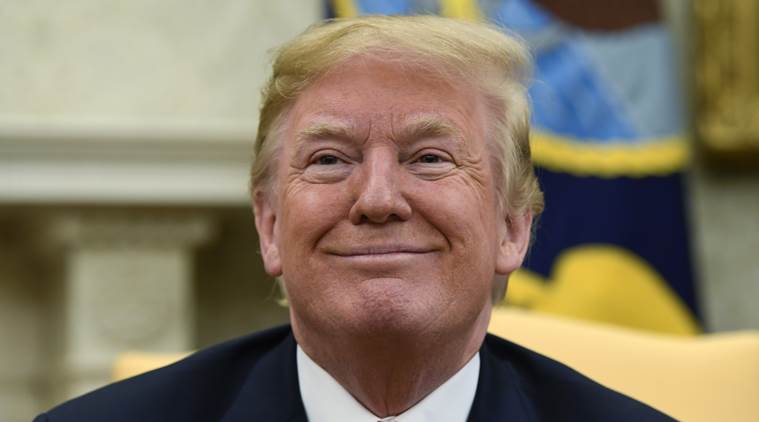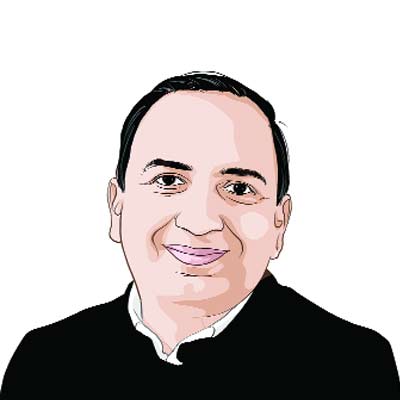Trump’s disruptions
In the end, what he is doing may have more significance than who he is

Trump’s disruptions signify three mutually reinforcing trends. (AP Photo )
Donald Trump this week upset the existing world order in multiple ways. But assessing the nature of these disruptions is difficult. It is hard to disentangle the measures countries adopt from the men that promote them. In Trump’s case, the deep distaste of his persona, and his domestic bigotry, will be grafted onto his foreign policies. With disruptions of the scale underway, it is genuinely hard to predict how they will turn out. But it is worth looking beyond the persona to see the underlying trends he represents.
Trump’s disruptions signify three mutually reinforcing trends. First, he has signalled “end of the west” as a coherent ideological and geo-political entity by disrupting the G-7. Second, he is making it clear that America does not want to sustain Pax Americana. It is not willing to pay the price for it in terms of troops or financial commitments. Third, he is putting America first, and in rhetoric, rolling back on post-Cold War globalisation. In any other context, these three trends would have warranted more reflection. The starkness with which he pursues them has also exposed the contradictions of dominant liberal approaches to international order.
As much as we might think of the G-7 as an entity united by political and economic values, in geo-political terms it was primarily an instrument of Western hegemony. If we genuinely believe that the world is becoming more pluralistic, multi-polar and less hegemonic, there is no particular reason to privilege the G-7. A pragmatic case could be made that a united G-7 now provides a bulwark against the worrying prospect of Chinese and Russian ascendancy. But the idea of a special western privilege is over. It is this, not a concern for the world, that frightens Trump’s critics more.
Second, Pax Americana has been an idea in trouble for quite a while, torn between overreach and underinvestment. On the one hand, the overreaching interventions in Iraq and Libya created the conditions for protracted instability. These interventions also convinced states that possessing nuclear weapons is a necessary currency of power. On the other hand, the sense that America does not wish to fully finance Pax Americana has also been evident for a while. But there was a tension in American approaches. On the one hand, it wants to, not entirely unjustifiably, resist Chinese and Russian ascendancy. It also wants to wear the mantle of liberal internationalism. But it did not want to pay the price. Trump is straightforwardly acknowledging that you cannot have your cake and eat it too. If you acknowledge that American power has its limits, then reaching out to your enemies makes far more sense. You drop the ambitions of trying to “fix” Russia.
You drop the pretence that you can stand the high ground of human rights and democracy. Yes, your traditional allies are perturbed. But would not accommodation of Russia and China be the natural corollary of accepting declining American power? And the American public is probably quite at peace with this accommodation. It was largely elite ambitions that resisted the conclusion. It is an interesting question whether there is a kind of perverse humility about American power embodied in Trump’s approach, and it is this defeatism that is bothering his critics.
The case that does not fit this pattern is Iran. The Iran deal was a hard won accommodation, but one also that came at the risk of alienating America’s traditional friends, Israel and Saudi Arabia. Trump’s jeopardising the Iran deal is risky, not least for what it does for American credibility. Trump has clearly and aggressively placed his weight behind Israel and Saudi Arabia and this is fraught with consequences. But in West Asia, most presidents fail. Unless he is reckless beyond measure, Trump can probably absorb the costs of whatever ensues.
Third, there is surprise that it is Trump not China that is disrupting the global trading order. Growing inequality, wage stagnation and deindustrialisation is being blamed on globalisation. Trump may not be sincere about domestic instruments to address these challenges. But analytically, liberal internationalists have not faced up to the possibility that there may indeed be a trade-off between domestic autonomy for policy action and globalisation. Politically, most of the world seems to be increasingly feeling that way. In a context where the democratic legitimacy of globalisation is in question, Trump’s playing to his constituency is entirely understandable.
Trump’s three disruptions — the end of the West, the accommodation with authoritarian great power rivals and therefore signalling the end of Pax Americana, and his attack on globalisation — have an odd coherence to them. The traditional foreign policy establishment thought it could hold on to these ideas without paying the price for the pathologies that went with them: Western privilege, imperial overreach, and inequality.
Trump has embraced the idea that these had a price and is now overturning them very crudely and in ways that enhance risks. But the real challenge for the world is that in America politicians are clearly sensing that this is the zeitgeist. The real truth Trump is exposing is that America’s elites were running foreign policies that were misaligned with domestic sentiment. Often, this did not matter since elites often have huge latitude in foreign policy. But Trump has also buttressed his anti-establishment credentials by constantly asserting that he might do things, simply to cock a snook at the establishment.
How will the Kim-Trump summit work out? It is too soon to tell. The US has not got anything. US allies will be nervous, the existing Asian security order has been disrupted, and Kim has got all the legitimacy he wanted: Recognition as a ruler who is apparently “loved” by his people, and acknowledgment as a fully-fledged nuclear weapons state. The outcome will depend on what direction Kim takes domestically. Is the gameplan not so much to engage Korea on the nuclear terrain, but to hope that the broader political acceptability of North Korea in world politics will create a shift in its own orientation to the world. The game is no longer denuclearisation, but to make North Korea less threatening by not threatening it.
Major disruptions are underway in world politics. The transition from a world of default neo-cons, to a con man may not be reassuring. His persona carries great risks. What is he capable of contemplating? The world may also rue the fact that alternatives to Pax Americana may be worse. But there may be a deeper logic of public opinion at work here. The measures may have more significance than the man.
The author is Vice-Chancellor, Ashoka University. Views are personal
For all the latest Opinion News, download Indian Express App
More From Pratap Bhanu Mehta
- The Shangri-La momentPM Modi’s speech framed continuities, nuance in foreign policy. It needs full force of India’s example behind it..
- Where anything goesMessage of Cobrapost sting: Media subservience to power, its contempt for the citizen...
- The seething stateAmid increasing communalisation in Assam, anxieties are deepening over the Citizenship Amendment Bill...








































No hay comentarios:
Publicar un comentario